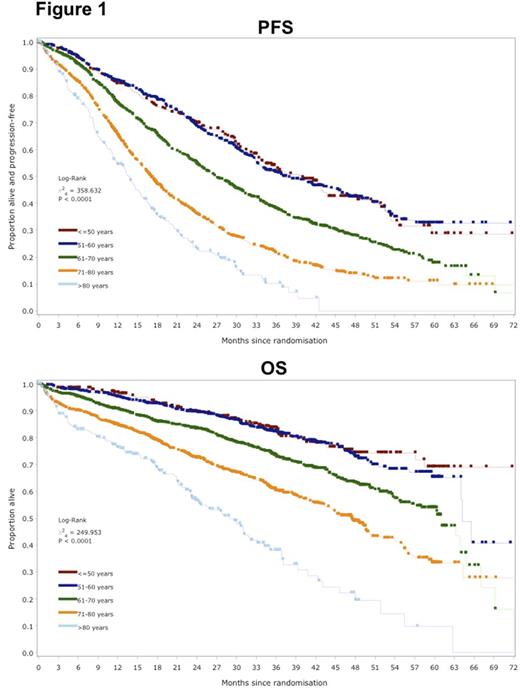Abstract
Background:
Phenotypically, high-risk myeloma is characterized by early progression and death. In younger patients this is known to correlate with a number of tumour acquired genetic changes such as the cytogenetic lesions t(4;14) and del(17p). Outcomes in older patients are further nuanced by features such as age, physical function and comorbidities, which play a role in treatment tolerability, dose intensity, duration and response. In this work we studied both patient-specific and tumour acquired variables and how these were impacted by age and their effect on outcome across patients of all ages in the NCRI Myeloma XI study.
Methods:
Myeloma XI recruited 3894 patients and compared a triplet combination of cyclophosphamide, lenalidomide and dexamethasone to a similar combination with thalidomide (CRD vs CTD). At maximum response a maintenance randomization compared lenalidomide till disease progression vs observation. We summarise important variables by age group (<=50 n=311, 51-60 n=671, 71-80 n=1247, >80 n=247). A multivariate Cox regression analysis was performed within each age group to identify the variables with the greatest effect on outcome. Adverse cytogenetic lesions were defined as t(4;14), t(14;16), t(14;20), del(17p) and gain(1q). Standard risk was defined as the absence of any of these lesions, High-risk one lesion and Ultra High-risk >1 lesion.
Results:
Neither progression-free (PFS) nor overall survival (OS) differed between patients aged <=50 years vs 51-60 but both significantly deteriorated with each additional decade of life thereafter (Figure 1).
The proportion of patients with impaired performance status increased significantly with age (p<0.0001) and changes in biomarkers of frailty such as low albumin were also seen (p=0.048). There was a significant increase in the time from presentation to initial randomisation with age (p<0.001), potentially reflecting access to healthcare. There was no statistically significant difference across ages in tumour burden at presentation with a similar proportion of patients having >20% plasma cells on bone marrow biopsy and no significant difference in LDH. There was a significant increase in B2M with age (p<0.0001) but this may reflect renal function rather than disease burden, supported by a significant increase in both urea (p<0.0001) and creatinine (p<0.0001).
The biological and genetic features of disease changed significantly across age groups. The youngest patient group (<=50) had an increased proportion of IgA subtype and decreased proportion of light chain only patients. In contrast the light chain type did not differ with age. The proportion of patients with each of the cytogenetic risk lesions t(4;14) and del(17p) fell significantly with age whilst those with gain(1q) increased. Therefore, despite these changes the proportion of patients classified as High-risk or Ultra High-risk did not change but the spectrum of lesions responsible for the classification did.
Using multivariate Cox regression analysis of factors affecting PFS and OS we show that with advancing age cytogenetic based risk stratification has a lesser influence on outcome compared to other factors. Performance status had a clear impact on outcomes at all ages suggesting that physical frailty might be a more important driver of outcome that age itself.
Conclusions:
The spectrum and relative importance of patient-specific and tumour acquired biological and genetic features change significantly across age-groups of myeloma patients. This is important to understand as we design disease segmentation strategies to deliver personalized treatment approaches to improve patient outcomes. Whereas the focus in younger patients should be on targeting high-risk disease biology, approaches to improve outcomes for older patients will require a focus on clinical variables and treatment modification strategies.
Pawlyn: Janssen: Other: Travel support; Takeda: Honoraria, Other: Travel support; Celgene: Honoraria, Other: Travel support. Kaiser: Celgene: Consultancy, Honoraria, Research Funding; Janssen: Honoraria; Takeda: Consultancy; Amgen: Consultancy, Honoraria; BMS: Consultancy, Other: Travel expenses; Chugai: Consultancy. Jones: Celgene: Honoraria, Other: Travel Support, Research Funding. Jenner: Chugai: Membership on an entity's Board of Directors or advisory committees; Amgen: Consultancy, Honoraria, Membership on an entity's Board of Directors or advisory committees, Other: Travel Support, Research Funding, Speakers Bureau; Takeda: Consultancy, Honoraria, Membership on an entity's Board of Directors or advisory committees, Research Funding, Speakers Bureau; Janssen: Consultancy, Honoraria, Membership on an entity's Board of Directors or advisory committees, Other: Travel Support , Research Funding, Speakers Bureau; Novartis: Consultancy, Honoraria, Membership on an entity's Board of Directors or advisory committees, Speakers Bureau; Celgene: Consultancy, Honoraria, Membership on an entity's Board of Directors or advisory committees, Research Funding, Speakers Bureau. Drayson: Abingdon Health: Equity Ownership, Membership on an entity's Board of Directors or advisory committees. Owen: Janssen: Consultancy, Other: travel support; Celgene: Consultancy, Honoraria, Research Funding; Takeda: Honoraria, Other: travel support. Gregory: Janssen: Honoraria; Celgene: Consultancy, Honoraria. Cook: Amgen: Consultancy, Honoraria, Research Funding, Speakers Bureau; Takeda: Consultancy, Honoraria, Research Funding, Speakers Bureau; Glycomimetcs: Consultancy, Honoraria; Bristol-Myers Squibb: Consultancy, Honoraria; Sanofi: Consultancy, Honoraria, Speakers Bureau; Janssen: Consultancy, Honoraria, Research Funding, Speakers Bureau; Celgene: Consultancy, Honoraria, Research Funding, Speakers Bureau. Jackson: Celgene: Honoraria; Amgen: Honoraria; J&J: Honoraria; Chugai: Honoraria; Takeda: Honoraria. Morgan: Celgene: Consultancy, Honoraria, Research Funding; Bristol Myers: Consultancy, Honoraria; Takeda: Consultancy, Honoraria. Davies: Takeda: Consultancy, Honoraria; Celgene: Consultancy, Honoraria; Janssen: Consultancy, Honoraria.
Author notes
Asterisk with author names denotes non-ASH members.


